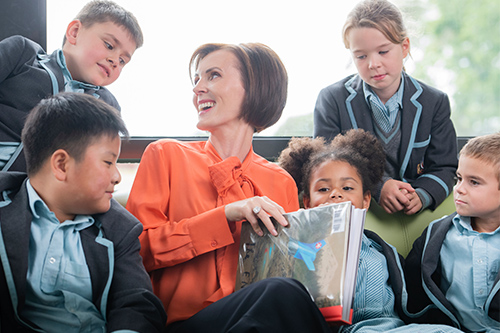
In 2018, Rebecca Cody made history as Geelong Grammar School’s (GGS) first female principal, as well as the first Australian-born to hold the role.
Prior to this, Cody was head of Methodist Ladies College (MLC) in Perth for eight years where she introduced a ‘Thrival Curriculum’ – coursework aimed at helping students better understand self-worth and belonging.
During her time at the College, she also introduced successful Positive Education programs, designed to cultivate positive emotions and character traits in students.
Positive Education at GGS has been recognised as one of the world’s 100 most inspiring education innovations by Finnish organisation HundrED.
“Our responsibility as educators is to equip learners with the competencies and attitudes to succeed,” Cody told The Educator.
“This includes teaching them the functional skills that are expected by our society; and equally, we need to educate in ways that will enable young people to lead a dignified, decent life”.
Cody referred to this as “the education of learning how to treat others fairly, developing compassion, broadening perspectives, employing inclusivity and acceptance, joyfully engaging with new ideas, and being creative in seeking solutions to problems that will inevitably come their way”.
However, she cautions that for the modern principal, teaching children to navigate ethical challenges and pressures is no easy task.
“Principals operate in vastly complex environments and navigating the various ethical challenges and pressures is no small feat. In this context, I reflect daily upon three concepts,” Cody explained.
The first concept, she said, is how to prioritise and model ethicality.
“I frequently explain this to students as: ‘say what you mean, mean what you say and walk your talk’,” she said.
“Such modelling includes making your thinking visible”.
The second concept Cody reflects on involves thinking about an important question during difficult decisions – that question being ‘What will future generations condemn us for?’, which was posed by the contemporary British-Ghanaian philosopher, Kwame Appiah.
“This deceptively simple question brings into focus what we know we should do, and somehow cuts through the noise of vested interests, competing values and support for status quo,” Cody said.
“Of course, as educators, we are fervently concerned with future generations, so I find this to be a simple and useful tool”.
Thirdly, says Cody, it is vital to provide “authentic opportunities” for students to practice their own moral judgement and ethical skills in a relevant context.
‘A day of protest isn’t necessarily a day lost to education’
Cody is a notable alumni of Cranlana Centre for Ethical Leadership, a not-for-profit organisation established by the Myer Foundation 25 years ago. The Centre delivers immersive courses that develop the ethical decision-making skills of Australia’s leaders from across the public, private and community sectors.
In her work as a school principal, Cody has drawn on the philosophical principles that she has learned through her experience at the Centre to inform many of the decisions she makes.
When asked about her views on whether principals should support students’ political action, such as the student climate strike, Cody said it was a complicated question that she struggles with as a leader.
“On one hand, and within a boarding context, I am charged with the safety of all students, so I cannot let them be off campus without supervision,” she said.
“That said, I’m inspired by young people who care about our collective future and want to be part of the change. Perhaps unlike others, I think a day of protest isn’t necessarily a day lost to education”.
Cody said students are inevitably going to learn about people power, peaceful protest, standing up for what they believe in, grassroots movements, democracy and how politics works.
“The best outcome is that we make decisions together, that we take this as an opportunity for students to engage on serious topics with their peers, their parents and the school; that we assist them in determining the best course of action, and that we trust them to make sound decisions,” she said.
“I would rather work with them and avoid attendance at the protest potentially developing into an act of rebellion against the school”.
‘A scaffold for contemporary practice’
Cody pointed to the need for principals in 2019 to help guide the ethical decision-making skills of teachers – particularly new ones.
“I think one of the best things a principal can do is to drive fear out of schools, so that new teachers – and experienced ones too – feel they are guided to determine the best ethical outcome,” Cody said.
“They can ask for help without fear…they can discuss difficult situations and wicked problems, without fear…they are confident that they will be met with wisdom and support”.
Cody reflected on how she had been “blessed” with many teachers her my life, saying some of her greatest lessons have come from her elders, and others from five-year olds.
“We learn about decency and dignity when we are the recipients: when we see it in action; when others lead by example,” Cody said.
“Ethics – and how to live a virtuous life – are fascinating areas to investigate”.
Cody said it feels “universally human to discover the frameworks that underpin our society and how the greatest minds have approached perennial questions on how best to live”.
“Whilst we don’t have to agree with them, we can use their thinking as a scaffold for contemporary practice".


